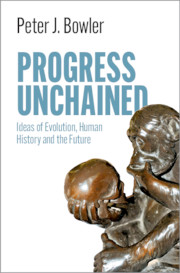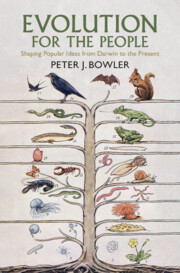Progress Unchained
Progress Unchained reinterprets the history of the idea of progress using parallels between evolutionary biology and changing views of human history. Early concepts of progress in both areas saw it as the ascent of a linear scale of development toward a final goal. The 'chain of being' defined a hierarchy of living things with humans at the head, while social thinkers interpreted history as a development toward a final paradise or utopia. Darwinism reconfigured biological progress as a 'tree of life' with multiple lines of advance not necessarily leading to humans, each driven by the rare innovations that generate entirely new functions. Popular writers such as H. G. Wells used a similar model to depict human progress, with competing technological innovations producing ever-more rapid changes in society. Bowler shows that as the idea of progress has become open-ended and unpredictable, a variety of alternative futures have been imagined.
- Offers new insights into the development of the idea of progress
- Links theories on the evolution of life to ideas about social development
- Charts correlations between ideas of progress in the past and speculations about the future
Reviews & endorsements
'From the antique idea of a Chain of Being to the continually branching Tree of Life, Bowler brings a lifetime of learning to the intellectual history of progress. Few could show us with such precision and clarity how progress came to be 'unchained', and what this history might mean for our own visions of the future.' Alison Bashford, University of New South Wales
'Evolutionary speculation has always been bound up with social ideas and hopes of progress. Peter Bowler argues that Charles Darwin altered the debate fundamentally, showing that evolution is no predetermined upward rise, but increasingly a function of human creativity. This wonderfully provocative book is as entertaining to read as its underlying erudition impresses. Highly recommended.' Michael Ruse, Professor Emeritus, University of Guelph
'In this timely and wide-ranging survey, a leading historian of evolutionary theory explores the doctrine of progress and the fate during the nineteenth and earlier twentieth centuries of pictures of an attainable utopia. Peter Bowler's study of writings in public science and science fiction provides fascinating reading for anyone interested in how models of what is to come changed in history and may change again.' Simon Schaffer, University of Cambridge
'… the book is well written and altogether thought provoking.' J. L. Hunt, CHOICE
Product details
February 2025Paperback
9781108829427
0 pages
Not yet published - available from February 2025
Table of Contents
- Preface
- 1. Introduction: ladders and trees
- Part I. The Ladder of Progress and the End of History:
- 2. From the chain of being to the ladder of creation
- 3. The hierarchy of humanity
- 4. Progress to paradise: Christianity, idealism and history
- 5. Ascent to utopia: the quest for a perfect society
- 6. End of an era?
- Part II. Toward a World of Unlimited Possibilities:
- 7. Darwinian visions
- 8. The uniqueness of humans
- 9. Branching out: the evolution of civilizations
- 10. Toward an uncertain future
- 11. Epilogue: where did it all go wrong?
- Bibliography.










